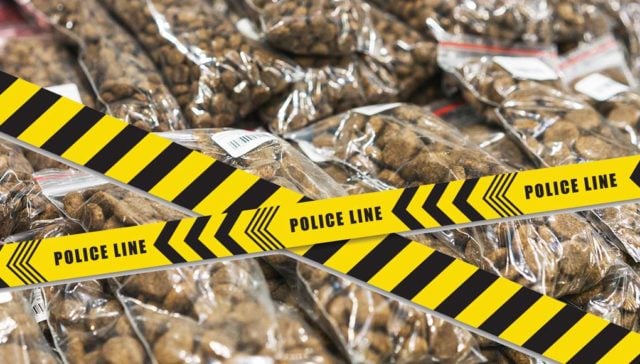
Table of Contents
Some ingredients that are cost-effective for pet food manufacturers might be detrimental to a dog.
When shopping for your pet's next bag of kibble, beware of certain cancer-causing foods for dogs that have been found in poor-quality brands.
Preservatives, fillers, and chemicals are just some of the ingredients included in common dog food brands that can do harm.
Cancer-causing Dog Food Ingredients
First, it's important to note that these claims are not universally accepted, and there is ongoing debate and research about the potential links between dog food and cancer.
Some of the worst dog food brands to avoid, according to one source, include Alpo, Beneful, Kibbles' n Bits, and Ol' Roy.
Let's dive into these 12 toxic chemicals!
1. Ethoxyquin
Ethoxyquin is a commonly found preservative in dog food. Dog foods with fish meal will typically contain ethoxyquin (1), because the U.S. Coast Guard requires that all fish meal transported by boat be treated with ethoxyquin, according to USDA (PDF).
Ethoxyquin was originally developed as a herbicide.
So, why are we feeding this to dogs?
Dog food manufacturers use this preservative because it's cheap, but it is linked to a plethora of health problems (2, 3).
Not only can this preservative cause cancer of the liver, spleen, stomach, and skin, but it is also linked to kidney and liver damage, immune deficiency syndrome, and blindness (4).
All dog food with animal protein meals and animal fats are treated with preservatives.
This includes fish meal, chicken meal, beef meal, lamb meal, etc. But some dog food manufacturers use natural preservatives instead of potentially toxic ones.
Legally, dog food manufacturers have no requirement to disclose preservatives added ingredients before they reach the pet food manufacturing plant. This means that if dog food contains ethoxyquin, manufacturers aren't required to put it on the label.
The more fat that is in a product, the more preservatives the product will need, so look for dog foods with lower fat content. Check with your vet when purchasing a new brand of food, as they will know and often advise against certain cancer causing foods for dogs.
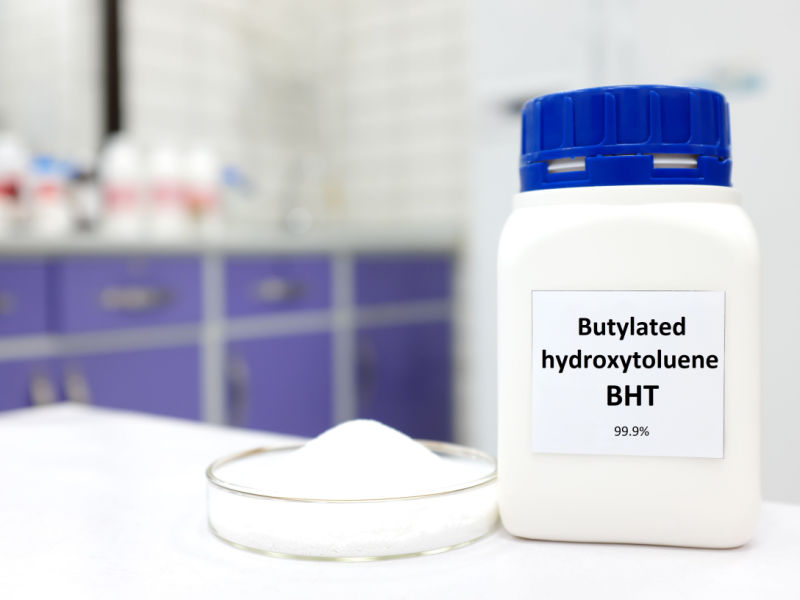
2. Butylated Hydroxyanisole and Butylated Hydroxytoluene
Butylated hydroxyanisole, or BHA, is a potentially harmful preservative commonly found in pet foods (5). The same goes for BHT.
Neither of these are natural antioxidants, but rather synthetic because of high temperatures when cooking the kibble.
Both are used to keep the kibble from going rancid and extending the shelf life of the food.
BHA is featured on the list of Known Carcinogens and Reproductive Toxicants from California's Office of Environmental Health Hazard Assessment.
It can be responsible for kidney damage in both dogs and humans.
While BHA was found to be safe in some cases, certain studies found this ingredient linked to breast cancer and testicular cancer (6, 7, 8).
While most dog foods simply need and will have to contain a form of preservatives, BHA is not essential to use and natural preservatives are a much safer option.
Look for dog foods with vitamin C, vitamin E, or even plant oils such as rosemary oil as preservatives.

3. Propylene Glycol
Propylene glycol is the main ingredient in antifreeze (9). It is also used in commercial dog foods, and some companies have been caught and accused of poisoning dogs.
This is a harmful substance with a sweet flavor that appeals to dogs. Unsurprisingly, it has been linked to some health problems, including anemia (10).
In a study of e-cigarettes, propylene glycol (which is used in e-cigs) was one of the contributors to cancer in people (11).
Lower quality dog food brands will commonly use propylene glycol to mask up the flavor of the food.
One health problem associated with this is the simple fact that dogs can become addicted to this sweet taste, and will refuse to eat healthier food when their owner upgrades to healthier brands.
4. Aflatoxin
This may be one of the most toxic ingredients found in cancer-causing foods for dogs (12). Aflatoxin is actually banned in some states and many countries (13).
However, in the states that still allow aflatoxin, such as Indiana and Oklahoma, it could still be contaminating your pet's food.
Aflatoxin is a byproduct of mold and one of the more dangerous ingredients in pet foods. It is a poisonous, cancer-causing toxin for humans, dogs, and livestock (14).
When exposed to aflatoxin, there's a 30 times greater risk of developing liver damage and liver cancer, especially for dogs with hepatitis (15, 16).
If you live in a state where aflatoxin is still allowed, check dog food labels for this ingredient. Pet food manufacturers have a way of finding loopholes to avoid labeling ingredients. Research online for reports of aflatoxin, and check with your veterinarian before deciding on a dog food brand for your dog.
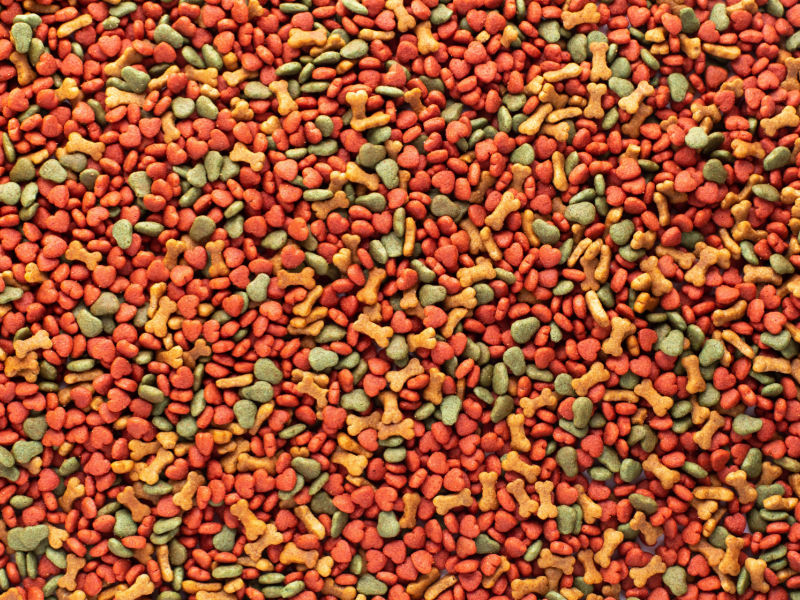
5. Blue Dye Coloring and Food Coloring
Blue food coloring, specifically Blue 1 and Blue 2 food coloring, can be very dangerous to animals (17, 18). It has been linked to brain tumors (19).
It isn't just blue food coloring that causes cancer in dogs: Green 2024 and Red 4 also increased the incidence of tumors (19).
The Center for Science in the Public Interest has made a whole chart explaining the dangers of each type of coloring.
Dog food does not have to be blue in color to contain these harmful dyes; the ingredients can still be found in many dog food products.
And
Check the ingredient list and avoid any dog foods with blue dye listed.
6. Specific Grains
Grains are debatable, but the takeaway is that not all grains are bad, and whole grains are beneficial to dogs, supporting their heart health (20).
Recently, the FDA found that completely grain-free diets are bad for dogs, increasing the risk of heart disease.
However, some specific grains remain harmful, and avoiding them is better because they may feed cancer (21).
The Cancer Treatment Centers of America website backs this up, stating that diets high in sugars raise the risk of cancer over time (22).
This is true for humans and dogs. Some grains are packed with simple carbohydrates and starches (simple sugars). Cancer cells grow stronger on diets of simple sugars.
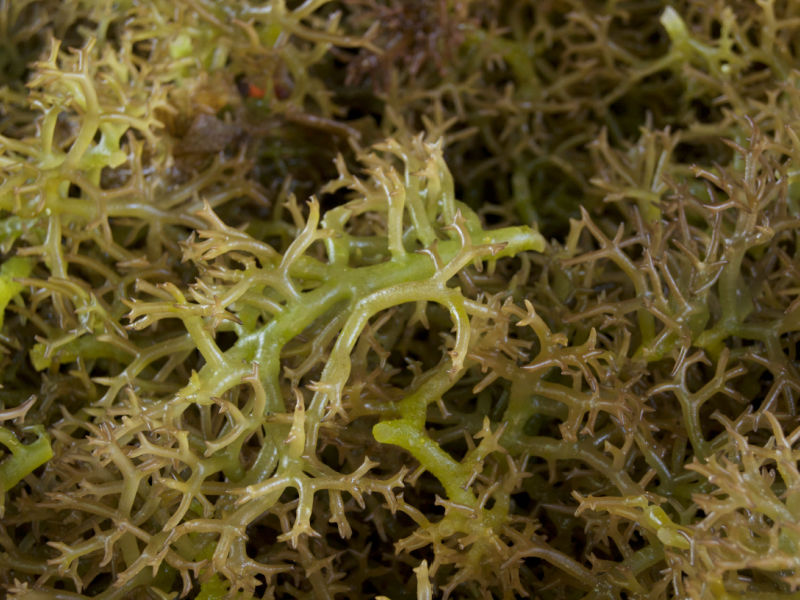
7. Carrageenan
Carrageenan is found in many dog food products, even natural dog foods. It is a thickener and emulsifier made from seaweed. While it may be natural, it can cause gastric inflammation in both humans and animals (23).
It is most commonly found in canned and wet dog food brands. There's little to no nutritional value to this ingredient, it's indigestible for dogs and it's included only to make the food more thick.
Due to lower manufacturing costs, cheap dog foods are more likely to contain this.
8. Food Industry Waste/Byproducts
Pet food manufacturers will commonly use food industry waste products in the production of dog food.
Food industry waste products include expired grocery store meats, animals that were sick and died, restaurant scraps, and other cancer-causing foods for dogs.
Keep your eye open for pet food labels that include ingredients such as animal fat and bone meal because they commonly contain sodium pentobarbital.
This compound is used by veterinarians to euthanize animals and is toxic to consume (24).
The byproduct is the internal remains of an animal. This is not muscle meat.
Similar to the grains issue, while byproducts are not always bad and sometimes even good, certain types of them will be diseased tissues, organs, and tumors.
9. GMOs
Not all GMOs are bad, most are very safe (25), and there are plenty of logical reasons include them (26). However, this does not come without risk, and certain types of GMOs are bad for humans, and also harmful for dogs. GMOs were loosely linked to some diseases, including cancer (27).
GMOs are used to accelerate the growth of crops and typically find their way into human and dog food. Many dog food brands claim to be GMO-free. However, unless the product is completely natural, it likely has some GMOs in it.
Over 90% of soybean and corn grown in the United States is genetically modified. Many pet foods feature these in their ingredients, so unless your pet food is certified organic, it is likely to contain GMOs.
10. Corn Products
Corn is an inexpensive filler commonly found in pet food, and it's not bad for dogs by itself (28).
But some products made from corn that end up in pet food are one of the common cancer-causing foods for dogs.
Cornstarch is allergenic to dogs (29). Corn syrup is sugar added to foods to help “sweeten” a dog's palate. But dogs don't need any type of sweetener added to their food. Naturally, dogs don't eat sweet things in the wild, so they don't need them in their diet.
Dogs do not require corn syrup, cornstarch, or other sugar sources in their diet.
Excess sugar can lead to health problems in dogs, including hyperactivity and weight gain.
Cancer cells also love sugar and feed off of it.
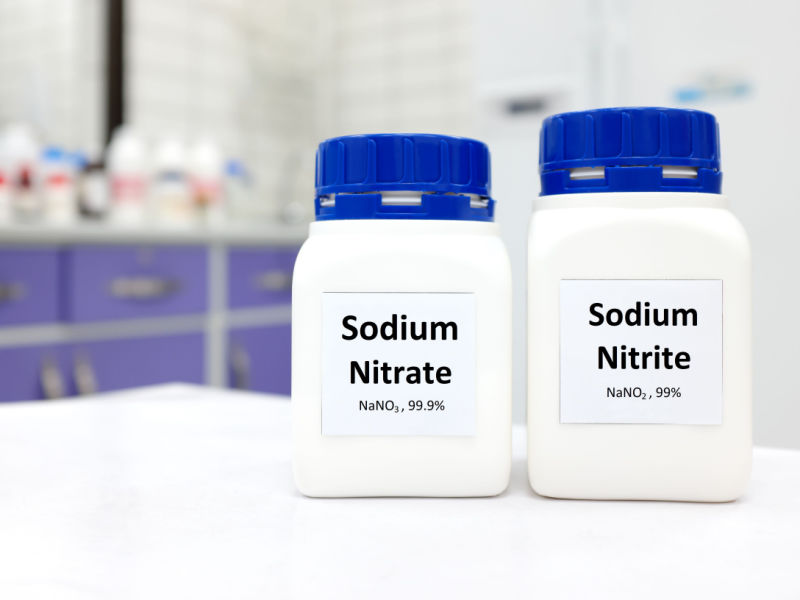
11. Sodium Nitrate
Sodium nitrate is a preservative used in some dog foods, particularly those containing cured meats.
It has been linked to the formation of nitrosamines, which are known carcinogens and may contribute to cancer development in dogs.
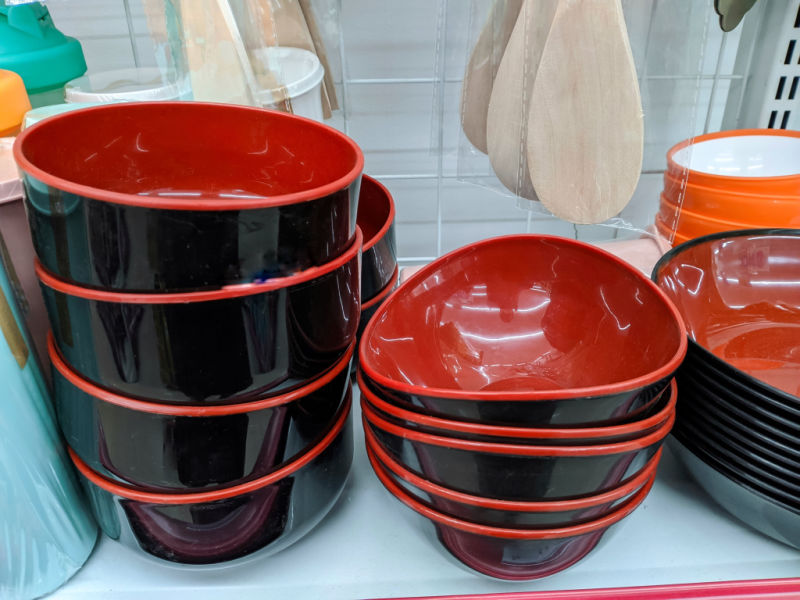
12. Melamine
Melamine is a chemical used in the production of plastics and has been found in some low-quality dog foods. It can cause kidney failure and has been linked to bladder cancer in dogs.
Healthier Alternatives to Commercial Dog Food
Healthier alternatives to commercial dog food include high-quality, grain-free dog foods that use natural preservatives like vitamins E and C. Additionally, feeding dogs a raw or home-cooked diet using fresh, whole ingredients can help minimize exposure to harmful chemicals.
Dog Food Brands Without Cancer-Causing Ingredients
Some dog food brands that prioritize natural, high-quality ingredients and avoid cancer-causing substances include:
- Orijen
- Acana
- The Honest Kitchen
- Canidae
- Wellness CORE
Always consult with your veterinarian before making changes to your dog's diet, and make sure to choose a brand that meets the nutritional needs of your dog's life stage and breed.
Cancer Prevention in Relation to Dog Food
Foods or Ingredients That Help Combat Cancer
Incorporating specific foods or ingredients into your dog's diet can help support their immune system and potentially prevent or combat cancer. These include:
- Omega-3 fatty acids: Found in fish like salmon and sardines, omega-3 fatty acids have anti-inflammatory properties that can help reduce the risk of cancer.
- Antioxidants: Foods rich in antioxidants, such as blueberries, spinach, and kale, can help protect cells from damage caused by free radicals and lower the risk of cancer.
- Turmeric: The active ingredient in turmeric, curcumin, has anti-inflammatory and antioxidant properties that may help prevent the development of cancer cells.
- Green tea: Green tea contains polyphenols, which are powerful antioxidants that can help prevent cancer and support overall health. Disclaimer: green tea is high in caffeine, and you should avoid giving your dog any substance that contains caffeine. You would need to get your hands on caffeine-free green tea so your dog can take part in the host of benefits it has!
Supplementation
In addition to incorporating cancer-fighting foods into your dog's diet, certain supplements can also help support their immune system and overall health:
- Probiotics: Probiotics can help maintain a healthy gut microbiome, which is essential for overall health and may play a role in cancer prevention.
- Vitamins and minerals: Ensuring your dog gets the right balance of vitamins and minerals, such as vitamin C, vitamin E, and selenium, can support their immune system and help prevent cancer.
- Digestive enzymes: Supplementing with digestive enzymes can improve nutrient absorption and support overall health, potentially reducing the risk of cancer.
Always consult with your veterinarian before adding any supplements to your dog's diet, as they can provide guidance on the appropriate dosage and duration of supplementation.
Conclusion
Understanding the cancer-causing ingredients found in some commercial dog foods is crucial for maintaining the health and well-being of your furry companion.
By choosing high-quality dog food brands and incorporating cancer-fighting foods and supplements into their diet, you can help minimize your dog's risk of developing cancer and support their overall health.
Remember to consult with your veterinarian before making any significant changes to your dog's diet or introducing new supplements.
READ NEXT: 8 Cancer-Causing Dog Products and How To Avoid Them












